Exploring Karama Furniture: A Deep Dive into Dubai's Market
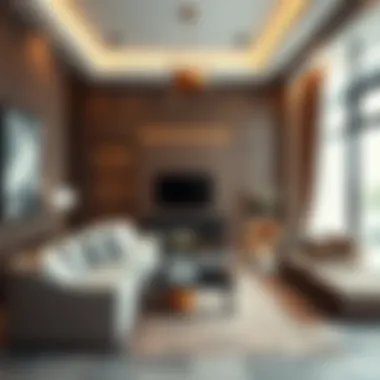
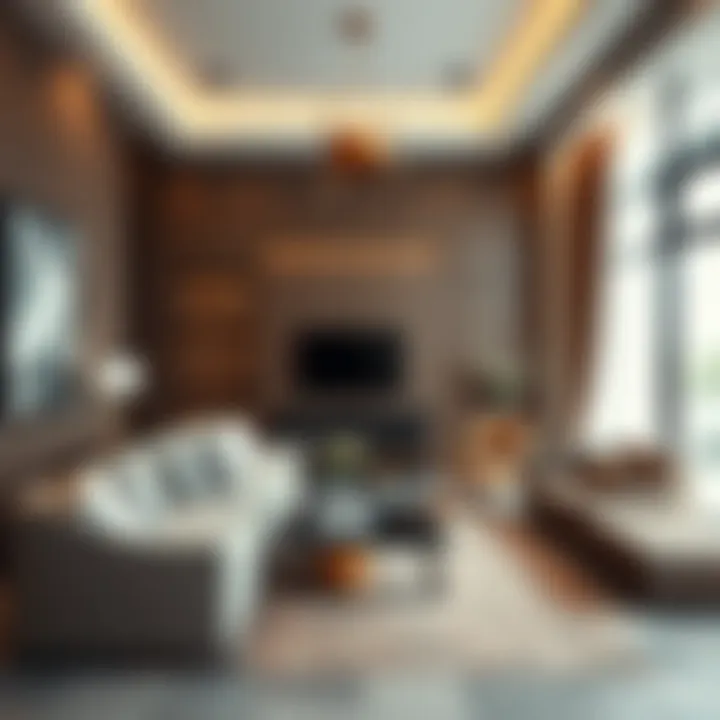
Intro
Karama, one of the bustling boroughs of Dubai, has carved a niche for itself in the local furniture market. The area is not just a melting pot of diverse cultures, but it also serves as a significant touchstone for home decor seekers looking for a mix of affordability and style. In this article, we will delve into Karama furniture and its relevance amidst the dynamic landscape of Dubai’s real estate sector.
As the city develops, the furniture market in Karama evolves too, being influenced by both domestic demand and broader economic trends. This exploration isn't simply about furniture; it's about understanding how these elements interplay to shape living spaces for homeowners, renters, and investors alike. Let's unpack the trends, offerings, and insights that define Karama’s unique market.
Market Trends
To comprehend the significance of Karama furniture, one must first look at the broader market trends affecting Dubai's real estate.
Current Property Prices
The rising demand for properties in Dubai has influenced pricing dynamics, making certain areas like Karama particularly appealing for both new homeowners and renters. Currently, property prices vary widely, depending on the specific neighborhood and the type of accommodation available.
- Affordable Housing: Karama stands as a beacon for those seeking budget-friendly options in the face of soaring prices elsewhere in the city. The average rent for a two-bedroom apartment here can hover around AED 60,000 per year, which is considerably lower compared to areas like Dubai Marina.
- Investment Potential: For investors, buying properties in Karama can be rewarding. The ROI is attractive, with many opting for furnished apartments, tapping into the steady flow of tourists and expats searching for short- to medium-term rentals.
Upcoming Developments
As Dubai continuously aims to enhance urban living, several upcoming developments in and around Karama are anticipated to reshape the furniture landscape.
- Mixed-Use Developments: Projects like the Dubai Creek Harbour and various community-focused developments are expected to attract new residents and businesses. This influx will likely boost the demand for stylish yet affordable furniture, which Karama merchants cater to adeptly.
- Infrastructure Upgrades: With improvements in transport links and community amenities, the area's desirability grows. The launch of new metro stations, better road connectivity, and parks will directly influence the appeal of Karama as a residential option.
As these trends unfold, the furniture market will undoubtedly adapt to meet the evolving preferences and needs of the community.
Investment Strategies
With the factors affecting the furniture market laid out, let’s dive into some strategic considerations for those contemplating investments in this sector.
Financing Options
When thinking about investing in furniture or even properties in Karama, understanding financing options is crucial.
- Personal Loans: Often, individuals tap into personal loans to fund their furniture purchases, especially those in need of a complete home setup.
- Partnerships: Collaborating with local furniture shops can offer bulk pricing benefits — think about negotiating deals to stock up rental properties with trendy pieces at competitive rates.
Risk Management Tips
Real estate investments come with their share of uncertainties. Here are some risk management tips to consider:
- Market Research: Staying informed about market dynamics will help you make educated purchasing decisions, especially about popular furniture styles and the ongoing economic climate.
- Diversification: Spreading investments across different types of properties and furniture styles can mitigate risks associated with market volatility.
- Quality over Quantity: Prioritize high-quality, durable furniture that will withstand wear and tear over time, especially in rental scenarios.
"When you invest in furniture, you're not merely purchasing items; you're creating environments that breathe life into spaces."
By keeping an eye on these elements, one can far better navigate the complexities of the Karama furniture market.
End
The relevance of Karama furniture extends beyond mere aesthetics; it reflects the broader socio-economic trends impacting Dubai's local market. With diverse offerings and a community in flux, this furniture sector is poised for continued growth, benefitting homeowners, renters, and savvy investors alike. Understanding the interplay between market dynamics and furniture trends can empower individuals to make informed choices in their real estate and decor endeavors.
Preface to Karama Furniture
Karama furniture has carved out a unique niche in Dubai's bustling market. More than just a collection of wooden pieces or upholstered chairs, it represents a confluence of culture, craftsmanship, and contemporary trends, making it essential for anyone looking to understand Dubai's evolving real estate landscape. Within this dynamic setting, the popularity of Karama furniture is influenced by diverse factors, from local traditions to modern-day preferences.
By analyzing the importance of this specific segment, readers gain insights into how it serves homeowners, renters, investors, and property managers alike. Understanding Karama's market can unlock potential investment opportunities and help buyers navigate their choices with confidence.
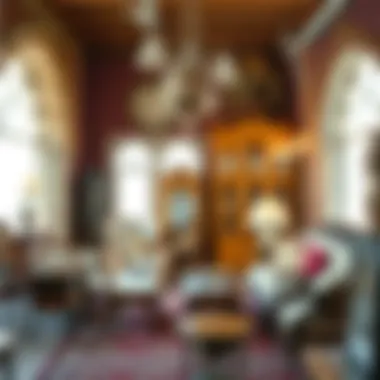
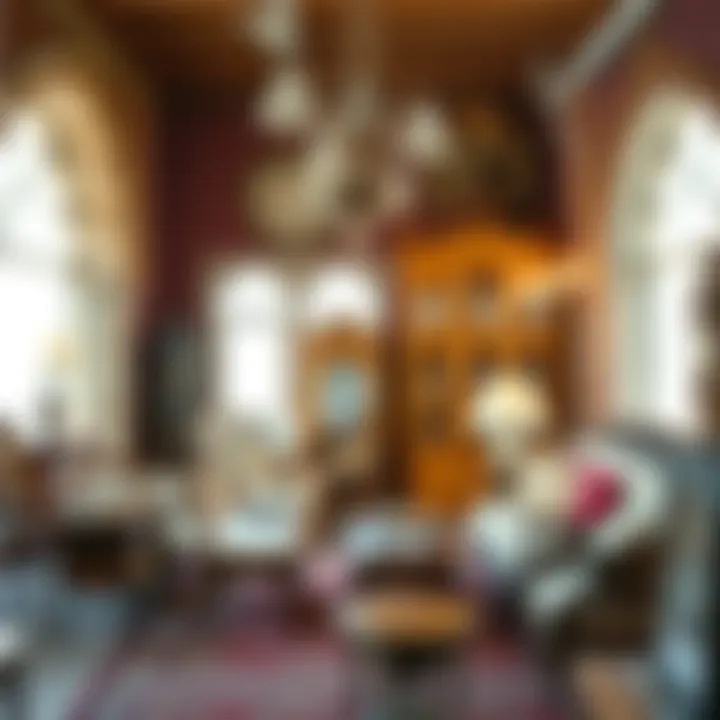
Overview of the Karama District
Karama, nestled in the heart of Dubai, is more than just a residential area; it’s a cultural melting pot. Known for its vibrant streets and welcoming atmosphere, this district attracts a mix of expatriates and locals. People often flock to Karama for its affordable housing options, bustling marketplaces, and lively dining scenes. The area’s reputation is bolstered by its accessibility and proximity to other key areas of Dubai, making it a desirable location.
Historically, Karama has served as a crucial hub for trade and commerce. As the district has evolved, so too has its approach to furniture. While visitors might initially see rows of shops selling traditional woodwork or overly ornate pieces, they’ll soon discover a wide tapestry of styles that reflect both global and local influences.
Historical Context of Furniture in Karama
The furniture scene in Karama boasts a rich history interwoven with the broader narrative of Dubai’s development. Once dominated by traditional craftsmanship, where artisans showcased their woodwork skills and intricate designs, the landscape has shifted dramatically in recent years. With the influx of different cultures and ideas, there has been an interesting blend of old and new.
During the initial growth phases of Dubai, the design of furniture primarily catered to functionality. However, as the city began to embrace international trends in aesthetics and interior design, Karama furniture also started to reflect these changes. There was a pivot towards incorporating modern styles, sustainable practices, and customized options which aligned more with the demands of residents today.
Importantly, understanding the historical context provides valuable insights into current preferences and trends in the marketplace. For instance, many buyers today often gravitate towards pieces that marry traditional craftsmanship with contemporary flair, highlighting the continued relevance of the district's artistic roots.
In summary, exploring Karama furniture offers a remarkable window into how culture, history, and market demands shape the local offerings. This engaging narrative sets the stage for the deeper exploration of Karama's furniture significance in the broader Dubai market.
Significance of Karama Furniture in Dubai's Market
Karama furniture plays a pivotal role in shaping the local market of Dubai. Not only does it reflect the cultural fabric of the city, but it also significantly influences economic dynamics. The furniture sector in Karama showcases more than just items of utility; it’s a blend of tradition and modernity that directly correlates with consumer trends and lifestyle preferences in this vibrant area.
Diving into the importance of this furniture sector unravels various factors worth discussing. First is its direct impact on local businesses, which leads to job creation and boosts the economy. Furniture shops, showrooms, and bespoke craftsmen are all part of a larger ecosystem that thrives on the needs of residents and visitors alike.
Moreover, the offerings found in Karama highlight the preferences of a diverse clientele. As Dubai attracts expatriates from around the globe, the demand for unique, culturally resonant furniture options has surged. Local craftsmen often draw inspiration from various international styles while infusing it with a distinct local flair. This amalgamation not only caters to the tastes of foreign residents but also nurtures a sense of community among locals who value heritage.
Another significant aspect is the affordability and accessibility of Karama furniture. The district is known for providing a range of prices, which makes it approachable for various economic classes. This availability ensures that both high-end and budget-conscious consumers find fitting options. Consequently, the analysis of consumer behavior here becomes vital to understanding broader market trends in Dubai’s real estate landscape.
Economic Impact on Local Businesses
The economic implications of Karama's furniture market are as diverse as they are significant. Local businesses benefit from the foot traffic generated by both residents and visitors who come to explore the options available. The affordability combined with quality leads to high turnover in retail spaces. As a result, small furniture shop owners can compete effectively against larger brands, leading to a healthy marketplace.
- Boosting Local Economy: Each transaction contributes to the livelihoods of shop owners, artisans, and delivery services.
- Job Creation: Many businesses hire local workforce, which in turn helps in reducing unemployment rates.
- Cultural Preservation: By promoting traditional styles, local artisans maintain age-old crafting techniques that might otherwise fade away.
The impact isn’t contained within Karama alone; it extends to neighboring districts where thriving businesses work synergistically. Customers may visit Karama for furniture but often explore nearby areas for associated home goods, enhancing the overall economic landscape.
Consumer Preferences and Trends
Understanding consumer preferences is crucial to assess the significance of Karama furniture in the wider Dubai market. With the diverse population, tastes in furniture vary widely—from elegant Arabic designs to contemporary minimalism. This eclectic mix is not just a coincidence but a direct response to the international community living in Dubai.
- Vibrant Range of Styles: Shoppers can find traditional motifs alongside modern sleek designs, promoting a unique shopping experience.
- Customer Customization: Many shops offer custom-built furniture options, allowing consumers to personalize their spaces, which is particularly appealing in a city famous for its luxury lifestyles.
- Sustainability Practices: An emerging trend is the preference for sustainable and ethically made furniture. Many shops are now providing options that utilize recycled materials, appealing to environmentally conscious consumers.
As the real estate market in Dubai continues to evolve, so do consumer expectations and preferences. Observations on how shoppers respond to local offerings can provide invaluable insights for future developments in the furniture sector.
"Karama's furniture scene is a mosaic of global styles interwoven with local tradition. It's vital not only for aesthetics but also for economic vitality in the region."
Thus, highlighting the significance of Karama furniture extends beyond its local traits; it encapsulates a broader economic narrative that intertwines culture, community, and commerce within Dubai's fast-paced lifestyle.
Types of Furniture Available in Karama
When delving into the offerings of Karama furniture, it's essential to grasp the distinct varieties available in this vibrant market. The furniture in Karama is not just about aesthetics; it reflects the diverse tastes and values of the community. Understanding these types can aid buyers in making informed choices, ensuring that their furniture aligns with their needs, preferences, and lifestyles.
Traditional vs. Modern Styles
Karama presents a fascinating juxtaposition of traditional and modern styles, catering to a wide array of tastes.
- Traditional Styles: Much of the furniture available here draws from the rich cultural heritage of the region. This includes intricately carved wooden pieces, ornate sofas adorned with vibrant fabrics, and dining sets that resonate with the Middle Eastern aesthetic. These pieces often showcase craftsmanship that has been passed down through generations, embodying history and tradition. For many residents, owning traditional furniture serves not just as a functional choice, but as a representation of their heritage.
- Modern Styles: On the flip side, there’s a rising demand for contemporary designs characterized by clean lines, minimalist aesthetics, and functionality. Modern furniture in Karama aligns closely with global trends, often featuring materials like glass and metal. This style appeals to younger generations and expats who prefer a sleek, understated look that complements their fast-paced lifestyles.
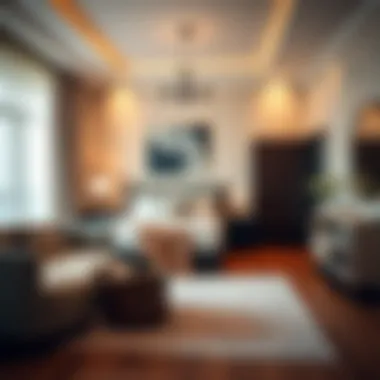

Ultimately, whether one leans towards the classic allure of traditional pieces or the simplicity of modern designs, Karama's market surely has something to fit the bill.
Custom-Built Options
In the heart of Karama, customization stands out as a significant advantage. Buyers have the option to commission custom-built furniture tailored to their specifications. This can be particularly important for those with unique space constraints or specific design visions.
- Personalization: Custom pieces not only reflect the homeowner's preferences but also allow for practicality in design. For instance, someone might need a sofa that fits a snug corner of their living room, or a dining table that accommodates a larger family gathering.
- Quality Assurance: Additionally, commissioning custom furniture often comes with the assurance of quality craftsmanship since these pieces are crafted by skilled artisans who take pride in their work. This aspect can be tremendously valuable for buyers looking for longevity in their purchases.
The ability to have furniture made to fit one's needs and style is an appealing aspect of shopping in Karama, making the market a go-to for discerning consumers.
Focus on Sustainable Materials
As the conversation around sustainability burgeons globally, Karama's furniture market is not left behind. Many vendors are increasingly prioritizing sustainable materials in their offerings, addressing both environmental concerns and discerning consumer preferences.
- Eco-Friendly Choices: Furniture made from reclaimed wood, bamboo, and other sustainable materials is becoming prominent. This trend aligns with a broader ecological awareness and a desire for responsible consumption among buyers.
- Durability and Aesthetics: Sustainable materials do not compromise on quality; instead, they often enhance the durability and aesthetics of the furniture. Buyers can enjoy peace of mind knowing their choices contribute to environmental preservation while also serving as beautiful, lasting additions to their homes.
As we explore the myriad offerings in Karama, these aspects of traditional and modern styles, customization, and sustainability serve as key touchpoints. Each choice reflects broader trends in design, lifestyle, and environmental awareness, making Karama not just a market, but a reflection of the evolving values of its community.
Shopping Experience in Karama
When it comes to finding the perfect furniture, the journey matters as much as the destination. Shopping in Karama is a unique experience, standing out not just for the variety of items available but also for the vibrant atmosphere that fills the air. This section delves into the various elements that make shopping in Karama special, exploring its benefits and considerations for potential buyers.
Comparison with Other Districts
In comparison to other districts in Dubai, shopping for furniture in Karama has its distinctive charm. While some areas like Jumeirah and Downtown Dubai feature high-end showrooms and luxury brands, Karama presents a more local flavor. Here, shoppers will find a blend of quality craftsmanship and competitive pricing, which is often absent in posher areas.
Karama’s furniture shops cater to various tastes – from traditional Arabic designs to contemporary aesthetics. In many respects, it serves as a melting pot of styles reflecting the cosmopolitan nature of Dubai. Here are some points of comparison:
- Pricing: Typically, you can find better deals in Karama compared to more upscale districts.
- Variety: While luxury brands might offer exclusivity, Karama houses a diverse selection from various cultures and traditions.
- Personalized Shopping Experience: Many shop owners are not just vendors; they are artisans who delight in sharing their stories and expertise with customers.
This local interaction creates a warm, inviting atmosphere that makes the shopping experience less transactional and more relational. Buyers often leave with not just furniture, but stories interwoven with their selections.
Navigating the Market: Tips for Buyers
If you're considering a shopping spree in Karama, preparing ahead can make all the difference. Here are some tips to navigate this vibrant market:
- Do Your Research: Understand what you’re looking for before hitting the streets. Online catalogs often give a glimpse into what shops carry, helping to filter your options.
- Bargain Tactfully: Haggling is a part of the culture in Karama. Don’t shy away from negotiating; just remember to keep it friendly!
- Explore Off the Beaten Path: While the main streets are brimming with shops, don't overlook smaller alleyways where hidden gems can be discovered without the bustle of the crowds.
- Check Quality: Before purchasing, inspect the furniture closely. Some items might look appealing but could have issues that aren't immediately visible.
- Delivery Considerations: Many stores offer delivery, but it's vital to clarify the costs and timelines involved to avoid potential headaches.
Utilizing these tips can greatly enrich your experience, ensuring that you walk away not just with furniture, but with satisfaction and a sense of accomplishment.
"Shopping in Karama is like wandering through an artist's palette; each store adds a splash of color to the canvas of your home."
Influence of Online Retail on Karama Furniture
The digital age has changed how we buy and sell furniture. In Karama, the influence of online retail is a game-changer, transforming the local market landscape. As more consumers turn to the internet for their shopping needs, it’s essential to understand this shift’s implications for local suppliers and buyers alike.
Emergence of E-commerce Platforms
The rise of e-commerce platforms has made furniture shopping as simple as a click of a button. Websites like Souq.com or noon.com are now go-to destinations for home décor, providing a vast array of options, from traditional Arabian styles to sleek modern designs.
- Convenience: Customers no longer need to squeeze through crowded markets. They can browse various styles from the comfort of their homes. This eases the purchasing process significantly, encouraging impulse buys.
- Variety: Online platforms often showcase items from multiple sellers, allowing buyers to compare styles and prices without moving an inch. This wide selection is especially appealing in a cosmopolitan city like Dubai, where diverse tastes flourish.
- Accessibility: Small businesses can reach larger audiences. A local Karama furniture maker can now compete with established brands by creating an online presence, thereby democratizing the market.
As these platforms continue to grow, more people in Dubai are leaning towards online shopping. This trend significantly shapes consumer behavior, creating new expectations around delivery times and return policies.
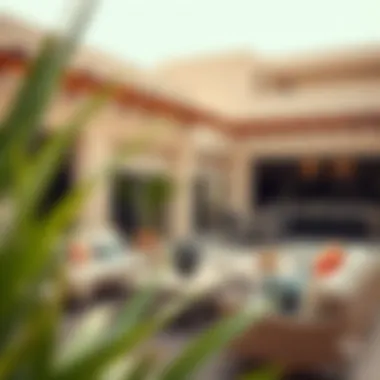
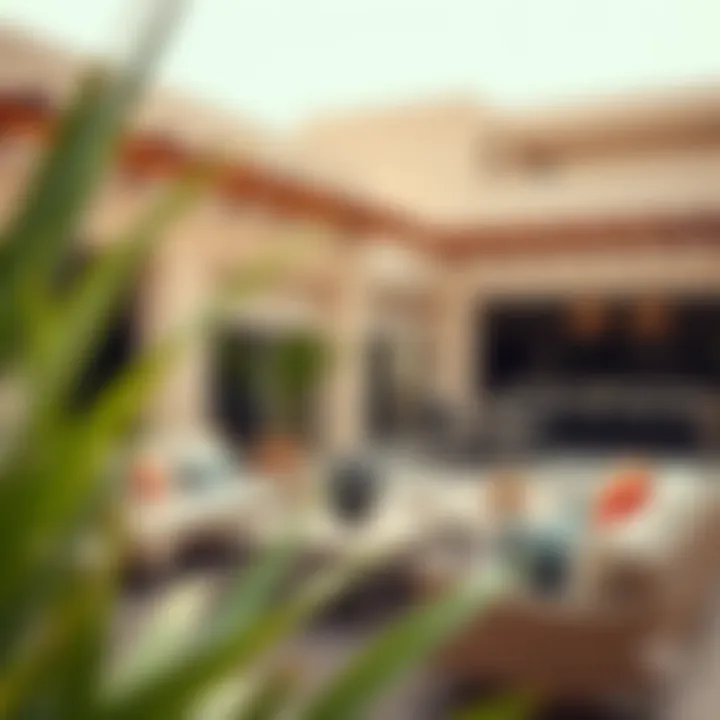
Challenges Faced by Brick-and-Mortar Stores
Despite the shiny allure of e-commerce, brick-and-mortar stores in Karama face challenges that can't be overlooked:
- Foot Traffic Declines: With many preferring online shopping, physical stores have seen a drop in customer turnout. This decline can hinder sales, especially for small businesses that heavily rely on local clientele.
- Price Competition: Online retailers can often offer lower prices due to lower overhead costs. Local shops need to rethink their pricing strategy and value propositions to attract customers.
- Experience Gap: Many consumers appreciate the tactile experience of shopping for furniture, wanting to see and feel products before making a decision. This urge creates a dilemma for physical stores, as they must offer unique in-store experiences to maintain relevance.
"Adapting is better than the alternative. Local shops must innovate to thrive in a digital age."
While online retail is on the rise, it’s not about the age-old struggle of digital versus bricks and mortar. It’s more about the potential for cohabitation. With the right balance between showcasing products online while maintaining a physical presence, Karama's furniture market can leverage both channels to create a robust shopping experience that benefits consumers and retailers alike.
Future Trends in Karama Furniture
Karama's furniture market is at the crossroads of tradition and innovation. With Dubai's rapid development and the increasing global influences, examining the future trends in Karama furniture is essential. It encompasses not just the aesthetic and functional elements but also economic implications that ripple out to affect local businesses, homeowners, and investors alike. Understanding these dynamics can better equip stakeholders to navigate this ever-evolving landscape.
Impact of Global Design Influences
In recent years, global design trends have been woven into the fabric of Karama's furniture offerings. More designers are drawing inspiration from international styles, combining them with local aesthetics to create unique pieces. For example, the Scandinavian minimalist style, known for its clean lines and functional beauty, is gaining a foothold, captivating those who appreciate simple yet elegant designs.
Additionally, the bohemian eclectic trend, characterized by a mix of colors and patterns, has resonated well with the younger demographic looking to express individuality through furnishings. This blend creates an exciting disparity in available styles, where traditional Arabic designs meet contemporary aesthetics.
Benefits of Adopting Global Influences:
- Broadened Choices: Shoppers now have access to a diverse array of designs.
- Enhanced Quality: Many global brands are emphasizing quality materials, raising the bar for local manufacturers to match.
- Sustainability Practices: Many international designers are prioritizing sustainable methods, pushing local businesses to adopt environmentally friendly practices.
With this influx of global influences, the challenge for local artisans lies in maintaining authenticity while embracing modernization. The balancing act is crucial for sustaining Karama's cultural heritage while appealing to a more cosmopolitan clientele.
Anticipated Market Changes
As the market continues to evolve, several anticipated changes are on the horizon for Karama furniture. Whether it’s technological advancements, shifts in consumer behavior, or fluctuations in the economy, these changes hold significance for everyone involved in the market.
One notable change is the increasing customization of furniture. As consumers become more discerning, they seek personalized options that reflect their unique tastes and preferences. Family-owned businesses in Karama have begun to offer custom designs, allowing clients to choose materials, sizes, and finishes that suit their specific needs.
Additionally, demographic shifts, like an influx of expatriates and millennials, are shaping the market. Younger buyers are drawn towards affordable yet chic furnishings that complement urban living spaces without breaking the bank. This fuels growth for businesses that cater to this emerging demographic.
Key factors that are likely to influence market changes include:
- Technological Integration: E-commerce platforms will continue to grow, compelling brick-and-mortar shops to innovate their customer engagement strategies.
- Cultural Fusion: As more diverse populations settle in the area, the demand for culturally blended pieces will likely increase, encouraging artisans to experiment with new designs.
- Economic Factors: The ongoing adjustments in Dubai’s real estate market can create ripples; for instance, growth in rental properties could boost demand for affordable furniture solutions, while upscale developments might lead to an increase in luxury pieces.
Understanding these future trends in Karama's furniture market prepares buyers and stakeholders for a landscape that will demand adaptability and foresight. The intersection of design, culture, and technology is reshaping consumer behavior, leading to a vibrant and dynamic market.
Ending
The closing sections of this exploration shine a light on the critical learning points surrounding Karama Furniture and its place within Dubai’s local market. As we venture through the various insights, it becomes clear that this segment of the city is more than just a shopping destination; it's a vibrant tapestry of culture, business, and evolving consumer expectations. The interplay of traditional craftsmanship with modern design aesthetics showcases the dynamic nature of the furniture scene here.
Understanding the key insights and developments within the Karama furniture market can significantly benefit stakeholders such as real estate agents, investors, and homeowners alike. This grasp of local preferences can aid in making informed decisions, whether one is decorating a new home, looking for investment potential, or simply staying abreast of market trends. As you sift through the findings presented, consider how they correlate with your specific needs and aspirations.
Summary of Key Insights
- Diverse Offerings: Karama's furniture market is characterized by its diversity, catering to varied tastes—from classic wooden pieces to chic, modern styles that suit contemporary aesthetics.
- Pricing Dynamics: The competitive nature of local retailers has resulted in attractive pricing, allowing for quality furniture options that won't break the bank.
- Consumer Trends: There’s a distinct shift towards sustainability and customized pieces, reflecting a more conscious consumer base that values environmentally friendly materials and personal expression in their home decor.
- Impact of E-commerce: While brick-and-mortar shops are integral to Karama’s identity, the rise of online platforms is reshaping how consumers approach furniture buying, bringing convenience and variety to the forefront.
Looking Ahead: The Role of Karama Furniture
As we look to the future, it's evident that Karama Furniture is not resting on its laurels. The potential growth trajectory is promising, fueled by increasing demand from both local residents and those investing in Dubai’s burgeoning real estate market.
In particular, the blending of global design influences with local traditions offers a unique opportunity for artisans and retailers to innovate and attract a broader audience. Furthermore, the integration of digital solutions in marketing and sales strategies will forge stronger connections with a demographic that increasingly leans towards online shopping.
The ongoing evolution of this market signifies a robust future where Karama can continue to hold its own among Dubai's more high-end districts. Delving into this sector not only enhances one’s understanding of local culture and business dynamics but provides invaluable insights that can inform future strategies for anyone involved in Dubai's vibrant real estate landscape.
"Understanding Karama's furniture landscape is not just about styles and prices; it's about connecting with the heart of Dubai's evolving identity."
For those venturing into this wooden wonderland, it’s essential to keep an ear to the ground and an eye on future developments. The rich offerings and vibrant spirit of Karama Furniture will surely remain integral to Dubai's cultural fabric.







